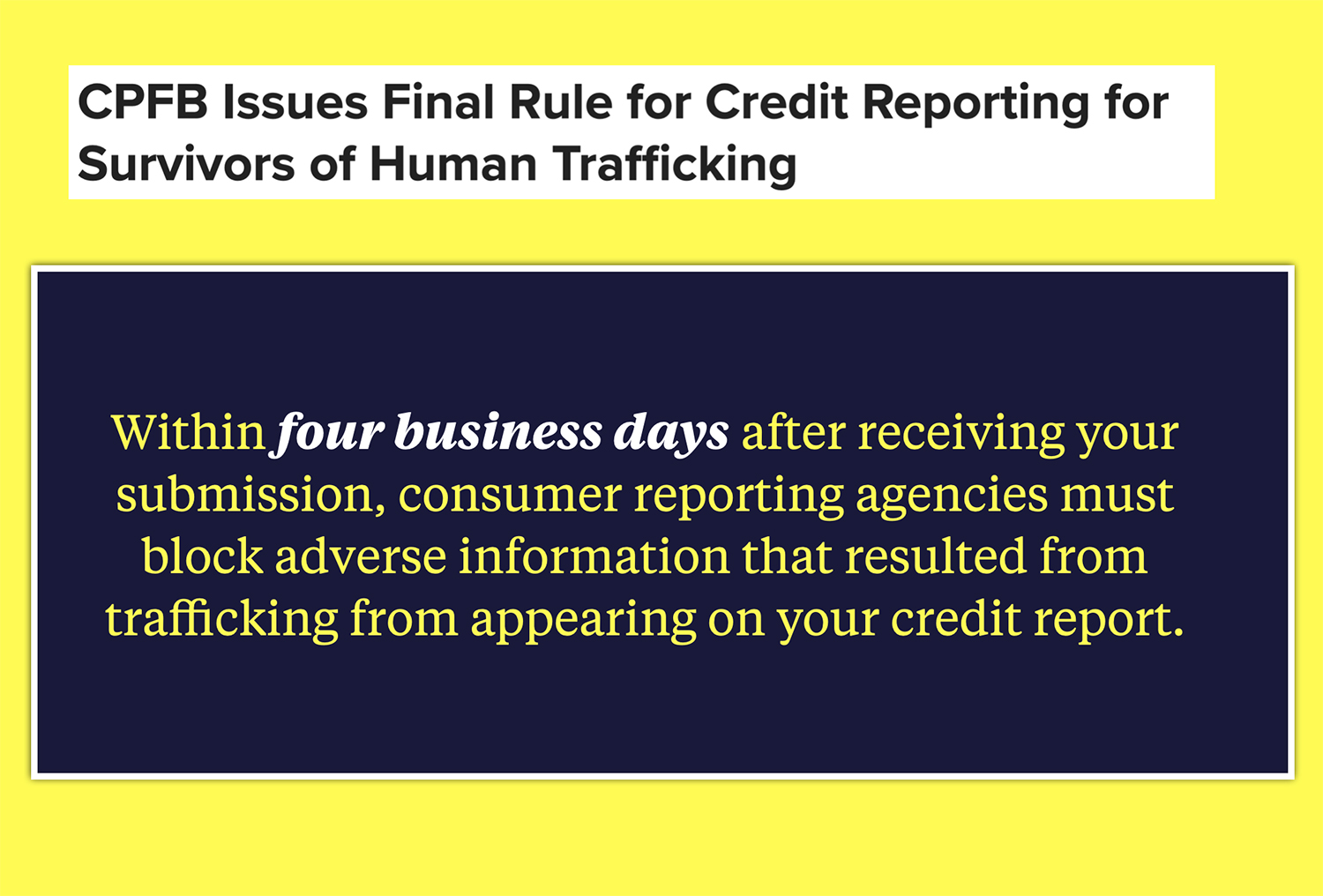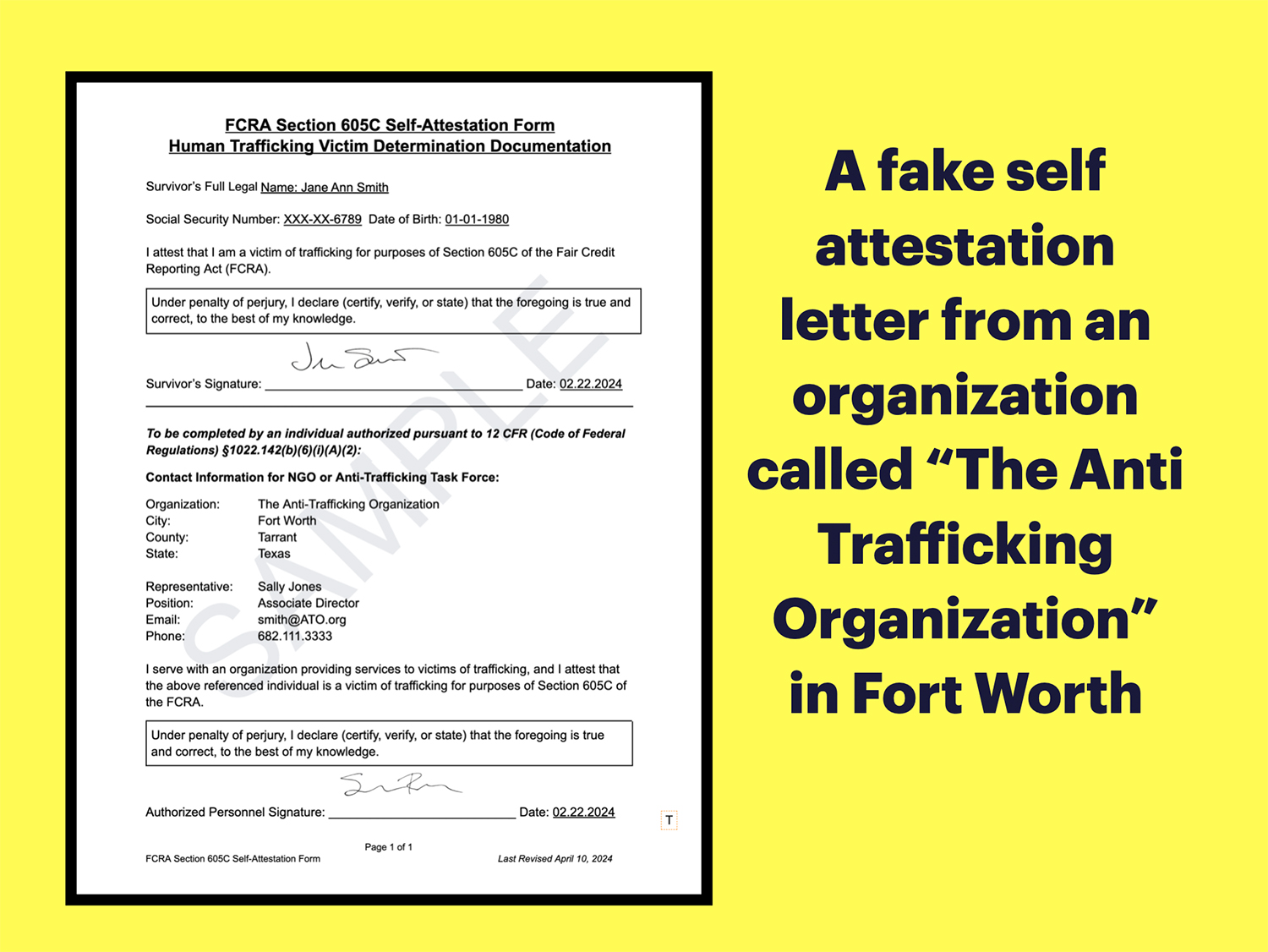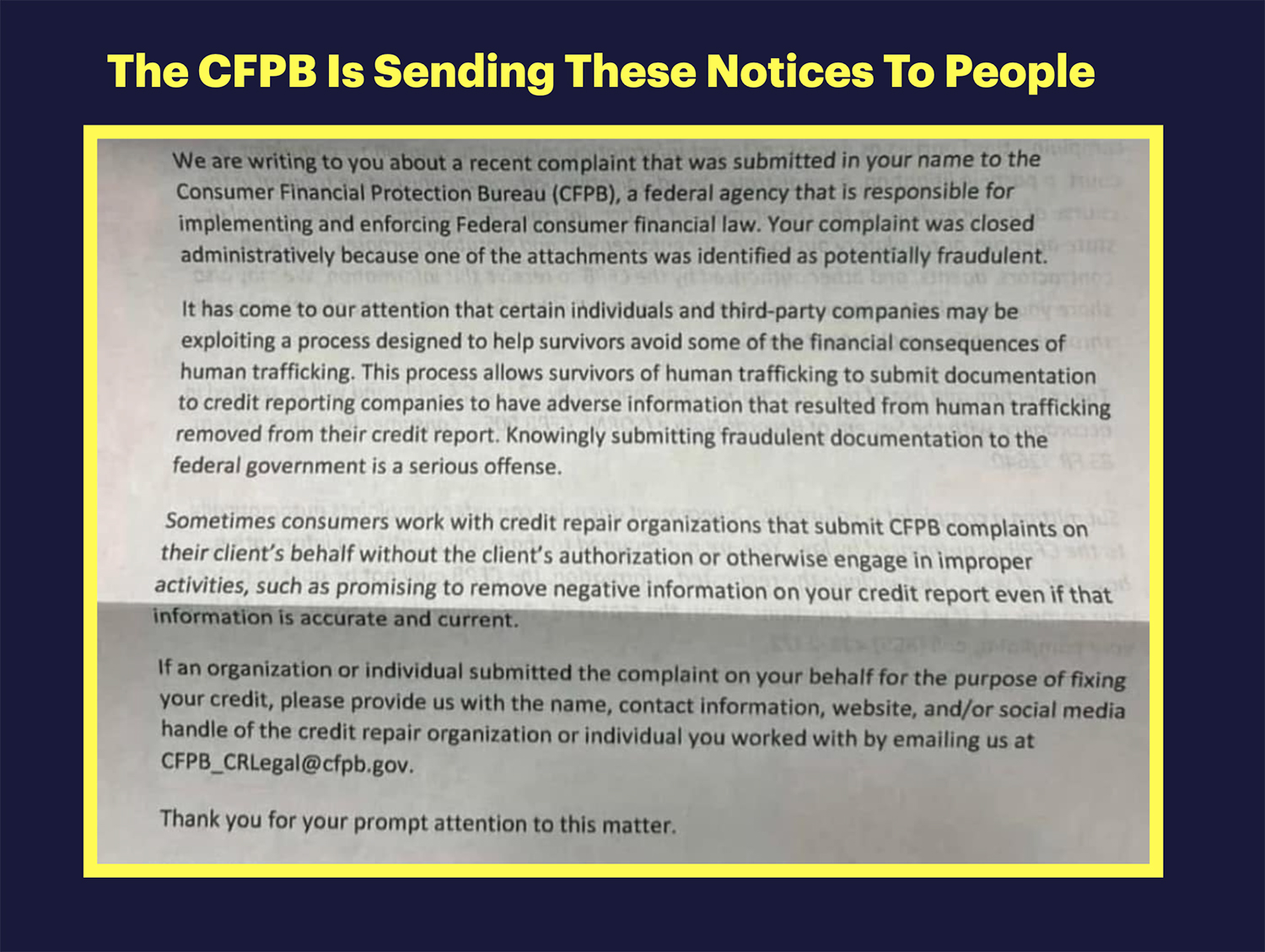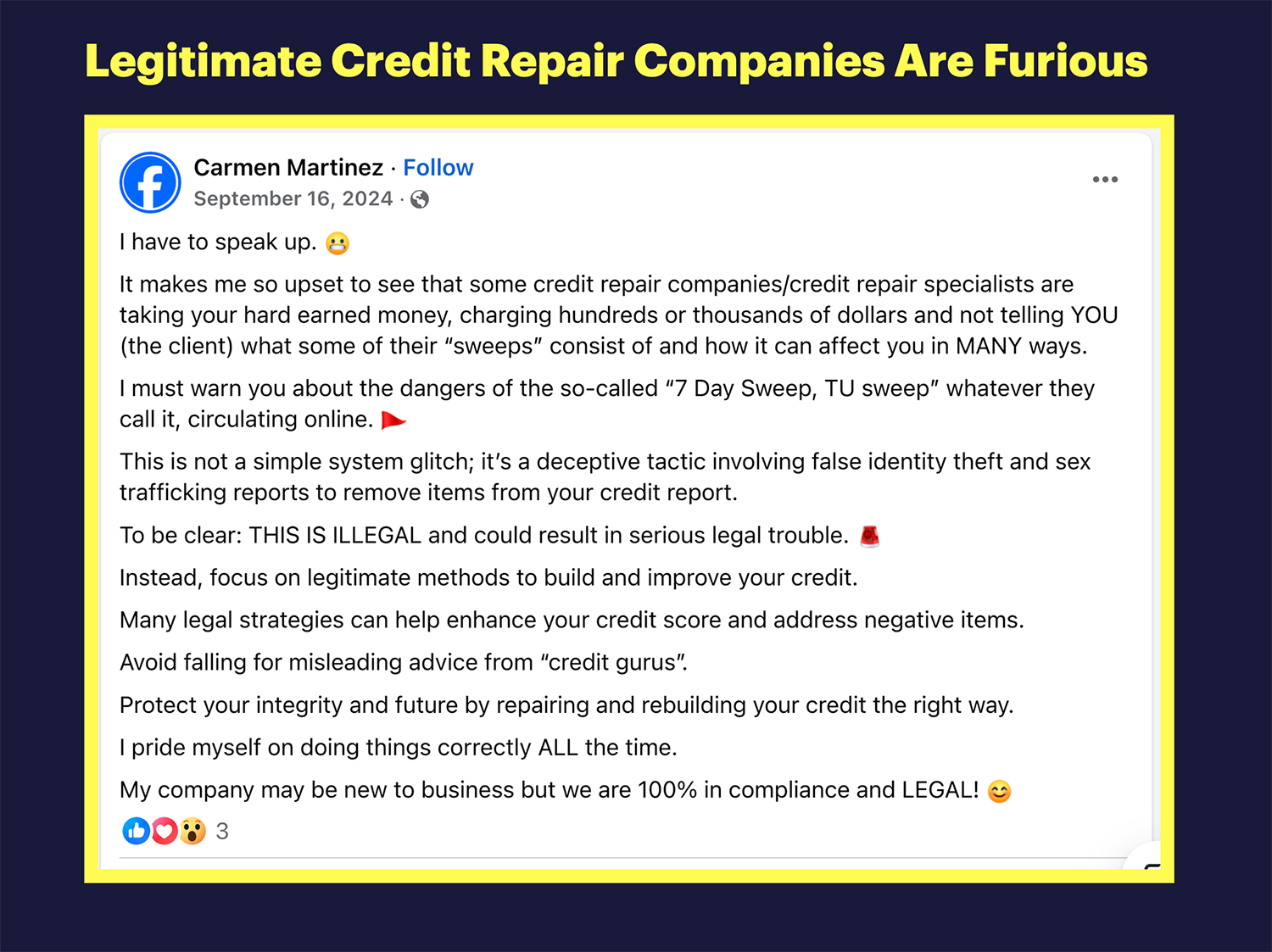A diabolical new fraud scheme is sweeping through the shadowy corners of the credit repair industry.
Unscrupulous credit repair companies are falsely claiming their clients are human trafficking victims to systematically and fraudulently remove negative items from their credit reports.
The scam exploits a protection implemented by the CFPB in 2022 to help actual human trafficking survivors rebuild their lives.
The Law Credit Washers Are Exploiting
In 2022, the CFPB implemented rules helping human trafficking survivors clean up their credit reports that might have been damaged while they were trafficked.
The law prohibits credit bureaus from including negative information resulting from trafficking, giving survivors a fresh financial start.

Victims can prove their status through government documents, court filings, or self-attestation verified by authorized organizations such as NGO’s.
The CFPB even provided a letter for victims to use here.
Shady credit repair companies saw this as a perfect opportunity to augment their credit washing activities which until then had focused entirely on filing false identity theft claims.
A Perfect Opportunity To Exploit Credit Bureaus and Banks
It didn’t take a few despicable credit repair companies long to realize that this new CFPB law could be used to their advantage.
Not only did it require the credit bureaus to remove the negative items within 4 days, they realized that banks would be highly reluctant to deny a human trafficking victim since the bad press and ramifications could be extremely detrimental.
So they took advantage of it.
The Viral 7 Day TransUnion Credit Sweep Emerges Soon After
By the end of 2024, the “7-day TransUnion sweep,” emerged on social media informing consumers that they could clean their credit by claiming that they were victims of sex trafficking.
The method was initially pitched as a glitch, but it was in fact just good old fashioned fraud.

The consumers could merely login to the credit bureaus, dispute all the negative tradelines and provide a self attestation letter explaining they were a victim of sex trafficking.
Fake Self Attestation Letters Are Used As Proof
At the heart of the exploit is a weekness in the CFPB program – the consumers can “self attest” that they are victims without the need for any government agency to verify.
Signatures from complicit NGO organizations or in some cases, outright forgeries could be used to prove the claim. A fillable forged attestation letter for example is available on this site.

When credit bureaus receive these claims, they immediately block the negative items from reporting while they investigate. This immediate blocking is required by law.
This temporary block usually occurs within about 7 days, which is why they call it a “7-day sweep.”
The Glitch – Human Trafficked Credit Sweeps for $1,500
For those people that wanted to do the 7 day sweep, there were credit repair companies more than willing to help. It was costly however, and the companies charge between $1,200 and $1,500 to perform the service.
An influencer on TikTok tells people how to get the method to work.
@shedatalksbiz Ok here’s the truth behind the Transunion Sweep! No gatekeeping 🙇🏽♀️ #diycreditrepair #consumerlaw #creditrepair #credithack #fyp
♬ original sound – Rasheda
“First you are going to want to setup an account on TransUnion.com”, the influencer says.
Then you are going to want to include all of the accounts that were acquired when you were air quotes “human trafficked” in your removal request to the credit bureau,” she continues. “Then you will need to upload a victim determination letter.”
“Its that easy”.
The CFPB Is Investigating The Scam And Warning Consumers
Apparently the CFPB has caught wind of the scam and is actively investigating people who may have filed false trafficking reports.
Perhaps it was the flood of claims that suddenly spiked after it went viral on social media.
In an image posted to Facebook, a client received an ominous letter from the CFPB that they were investigating this new credit washing scam.
“It has come to our attention that certain individuals and third-party companies may be exploiting a process designed to help survivors avoid some of the financial consequences of human trafficking”, the official states.
“This process allows survivors of human trafficking to submit documentation to credit reporting companies to have adverse information that resulted from human trafficking removed from their credit report. Knowingly submitting fraudulent documentation to the federal government is a serious offense”.

Consumers Don’t Realize Their Claims Are Investigated
What many consumers didn’t realize is that the human trafficking claims trigger a verification process.
The credit bureaus don’t just take your word for it—they investigate the human trafficking claims with appropriate authorities. As one credit repair professional warned on social media: “They block it while they investigate with the Human trafficking department to verify if you were a victim.” This investigation is thorough and designed to identify false claims.

Legitimate Credit Repair Companies Blast The Practice
On social media, the practice of using placing customers on the trafficked persons list is also resulting in a backlash.
“I have to speak up.” says Carmen Martinez on her Facebook page, “It makes me so upset”
“This is not a simple system glitch; its a deceptive tactic involving false identity theft and sex trafficking reports to remove items from your credit report. To be clear, THIS IS ILLEGAL”

Another YouTube influencer, Everything Credit is warning consumers of the scam as well and tells consumers that they are going to land in jail if they try to commit fraud using this scheme.
The ABA Had Warned Self Attestation Would Lead To Exploitation
Many saw this coming. In March of 2022, The American Bankers Association (ABA) had warned that exploitation of the program would might occur.
At the time, the association cautioned that the bureau “should not ignore the potential for abuse by people who are not trafficking victims and the resulting degradation and unreliability of consumer reports if the regulation is not implemented appropriately.”
They urged the CFPB to only use a court or government agency determination and not rely on self attestation. Those self attestation letters appear to be at the heart of the current credit repair exploits.
Four Red Flags To Watch For
Banks need practical ways to spot fake human trafficking claims. Here are 4 red flags that you can use to spot fake claims.
#1 – Suspicious Claims Patterns
Watch for multiple similar claims coming from the same credit repair company or geographic area within a short timeframe. A sudden spike in trafficking claims from a single source often signals an organized fraud operation rather than legitimate cases.
#2 – Documentation Red Flags
Be on alert when submitted documentation and letters use identical language across multiple unrelated claims or contains minimal personal details. Many of the documents use “cookie cutter” language that is the same across many different victims. When you can, call the number of the NGO that signed the attestation letter and confirm it is legitimate.
#3 – Verification Failures
Banks report that fake human trafficking claims often have the wrong documentation and that documentation cannot be verified with the issuing authorities.
Legitimate trafficking determinations come from recognized authorities and contain verifiable case information with details. Fake documentation is often general and can never be verified.
#4 – Rapid Withdrawals
Be wary when a claim is quickly abandoned when additional information is requested. Fraudulent filers (the credit repair companies) cannot verify the additional details required so the claim could be abandoned.
Watch for multiple claims that occur later as credit repair companies will often engage in multiple iterations of credit washing in hopes the banks cannot respond in time.



